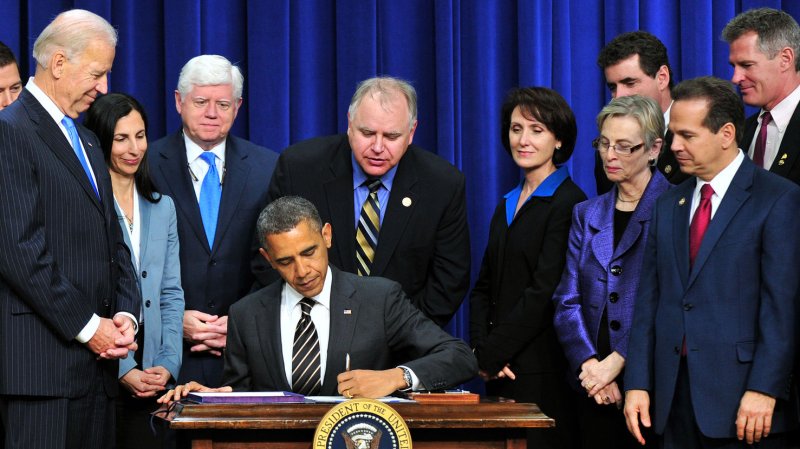U.S. President Barack Obama signs the Stop Trading on Congressional Knowledge (STOCK) Act on April 4. The law makes members of Congress subject to the same insider trading laws that apply to everyone else. UPI/Kevin Dietsch |
License Photo
WASHINGTON, Aug. 3 (UPI) -- House Republicans closed a potential loophole in their insider trading law that could have let family members of some lawmakers profit from insider information.
The Senate and House passed new legislation Thursday that would eliminate the loophole, after its existence was brought to the attention of congressional members by CNN.
The highly touted Stop Trading on Congressional Knowledge Act, or STOCK Act, was one of the few bipartisan bills that passed this year. It signed by President Barack Obama in April.
However, CNN found that each chamber offered separate interpretations of what the STOCK Act requires of its members. Broadly, the act requires that any trades of at least $1,000 made on or after July 3 be reported to the House and Senate within 45 days.
In the Senate, the Ethics Committee in June released guidelines ruling that members, spouses and dependent children all must file reports after they make stock or securities trades, CNN reported. The House Ethics Committee's memo found that the law covered House members and aides, but not their spouses or children.
The Office of Government Ethics, which oversees federal executive branch employees, agreed with the House, telling its employees their spouses and children didn't have to file periodic reports.
Sen. Scott Brown, R-Mass., the only Republican senator to attend the White House signing ceremony, told CNN he was "obviously very concerned."
"Say I find out some information, I tell my wife and she goes and trades on it, what's the difference?" Brown said.
Robert Walker, a Washington ethics attorney and former chief counsel for the House and Senate ethics committees, told CNN that the Senate bill included a provision that covered spouses and children, but when House Majority Leader Eric Cantor's office crafted the House version, the language governing spouses and children was moved to a different section of the bill, meaning spouses and children weren't subject to new reporting requirements.
In a written statement to CNN last month, the chairman of the House Ethics Committee, Rep. Jo Bonner, R-Ala., and the ranking Democrat, Rep. Linda Sanchez of California, defended the committee's interpretation.
"As has been noted by outside experts, the office of Government Ethics and various House offices of expertise, including the Office of Legislative Counsel and the Office of General Counsel, with whom the Committee consulted, the plain language of the STOCK Act and the Ethics in Government Act is unambiguous and beyond dispute," the statement said, "and the committee interpreted it correctly."















